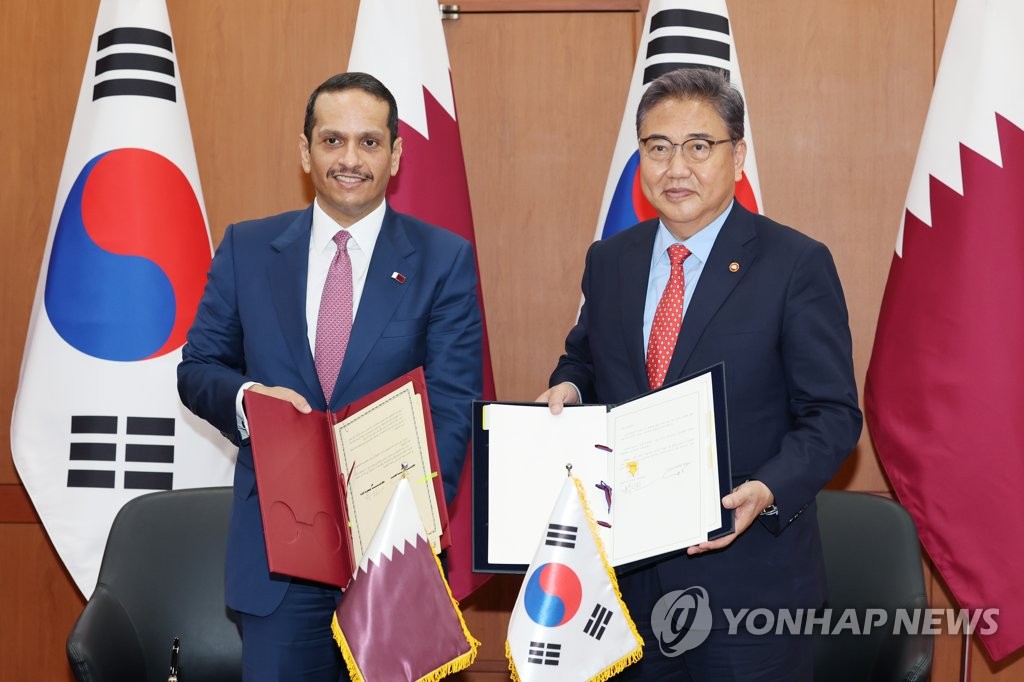For years, Qatar has been a major source of liquified natural gas (LNG) to South Korea as part of long-term contracts.
Qatar and South Korea signed a mutual visa exemption agreement for all passport holders of both countries, Doha’s foreign ministry announced on Wednesday.
The signing took place during a trip by Qatar’s Foreign Minister Sheikh Mohammed bin Abdulrahman Al Thani to Seoul, where he met his South Korean counterpart Park Jin. Sheikh Mohammed also met with National Assembly Speaker Kim Jin-pyo.
The visa exemption showcases growing ties between the two countries and comes shortly after Qatar and Vietnam agreed on a similar mutual visa exemption for diplomatic and special passports holders.
According to Yonhap News Agency, the agreement will take effect next month, allowing citizens of both countries to stay in Qatar and South Korea for 90 days without a visa.
According to previous travel requirements on Qatar Airways’ website, South Koreans wishing to visit Doha had to obtain a visa on arrival for 30 days of stay. The website further states a 30-day extension is possible for those traveling as tourists.
As for Qataris traveling to Seoul, they have to obtain the Korea Electronic Travel Authorisation (K-ETA) at least 72 hours before boarding.
Meeting agenda
South Korea is the last destination in an Asian tour by Sheikh Mohammed that kicked off in Singapore last week. The Qatari official then followed this with a visit to Malaysia and Vietnam.
During the meeting between the foreign ministers of Qatar and South Korea, the officials discussed energy cooperation as well as security partnership during the 2022 FIFA World Cup.
In July, South Korean reports stated the Asian nation’s army will dispatch five police officers specialising in counter-terrorism to Qatar to exchange security expertise.
The South Korean official also praised Qatar’s wide mediation role, including the Doha Peace Agreement for Chad, the hosting of indirect talks between the US and Iran, as well as its previous mediation between Washington and the Taliban.
Key energy partners
During the South Korea meeting, the speaker of parliament stressed the importance of Qatar’s role in the field of energy supply.
For years, Qatar has been a major source of liquified natural gas (LNG) to South Korea as part of long-term contracts.
The energy sector makes up a significant part of trade ties between the two countries, with South Korea importing an estimated 38 mtpa (million tonnes per annum) of LNG from both Qatar and Australia.
Last year, Qatar’s LNG shipments to South Korea reached almost 10 mtpa, accounting for at least 30% of the country’s energy needs, rendering the Gulf state as South Korea’s largest LNG supplier.
In July last year, Korean Gas Corporation (KOGAS), the country’s state-run company, signed a 20-year agreement with what was known as Qatar Petroleum at the time, before changing to QatarEnergy in October.
Under the agreement, KOGAS is set to purchase an additional two million tonnes of LNG per annum as of 2025, bumping the shipments to a total of 6.1 million. The deal came as the previous contract, worth 4.9 million tonnes, was coming to an end by 2024.
In 2012, Qatar’s Ras Laffan Liquefied Natural Gas Co inked a deal with KOGAS to supply the country with two million tonnes per annum of LNG, for 20 years as of 2013.
KOGAS had signed its first LNG deal with Qatar in 1995.
The deals are not limited to LNG, as QatarEnergy also signed an agreement with South Korea’s Hydrogen Convergence Alliance last year.
Both Qatar and South Korea aim to develop hydrogen as a source of energy as the Gulf state explores low-carbon energy solutions.
With Qatar moving towards becoming the largest LNG producer by 2030 through its North Field Expansion project, it signed a number of major agreements with prominent companies to help bump up its production.
Last year, Qatar ordered six LNG ships from South Korea.
The deal entailed the purchase of four ships from Daewoo Shipbuilding & Marine Engineering and two others from Samsung Heavy Industries. The orders are also part of a 2020 deal worth $19 billion.
In June, South Korea’s shipbuilders started receiving the first construction orders.
These carriers will be built at Okpo Shipyard in Korea and delivered to the Gulf client by the first quarter of 2025 for the North Field Expansion project.







